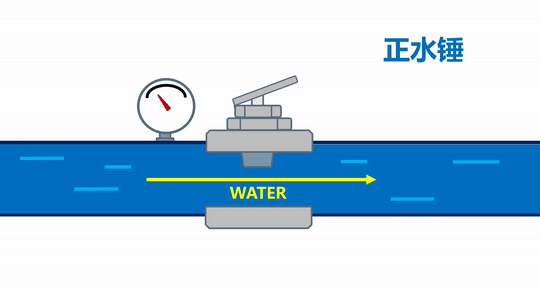Export Office: 21Floor, No.5 Nanhai Zhi Road,Qingdao, Shandong ,China
Work Shop: Beian Industrial zone, Qingdao,Shandong,China
+86 532 88550858
Martin
Inquiry now
Water hammer is a plumbing issue where pipes make loud banging or shaking noises. It happens when water flow suddenly stops or changes direction, creating a pressure wave. This wave travels through the pipes, causing vibrations. Knowing what does a water hammer sound like is key—it’s often a sharp bang or thud.This issue can occur any system with fast-changing water flow.

The pressure waves can stress pipes. This may lead to cracks or bursts. Repairs can be costly. Water loss is another issue. Water hammer can loosen pipe connections. This causes leaks. Over time, water hammer cause damage to valves and fittings.
One main cause of water hammer in pipes is closing a valve fast. When a valve shuts quickly, water flow stops instantly. This creates a pressure surge. The surge turns into a shock wave. It bangs against pipes. For example, turning off a faucet or valve too fast can start this.
Water pumps can also cause water hammer. When a pump turns off, water flow stops abruptly. This sends a pressure wave through the pipes. Starting a pump too fast can push water quickly. This creates a shock. This is common in big systems with large pumps.
High water pressure in pipes makes water hammer worse. When pressure is too strong, any sudden stop creates a bigger shock wave. This often happens in systems without pressure controls. High pressure makes water hammer symptoms louder. Damage is more likely. Companies should check water pressure often.
Water hammer can cause big harm. The pressure waves can crack pipes. Older or weaker pipes are at risk. This leads to leaks or bursts. Fixing them is expensive. Can water hammer cause leaks? Yes. The shocks loosen pipe connections and fittings over time. Valves and pumps may also break due to repeated stress. For companies, this damage can stop work. It increases repair costs. Recognizing water hammer symptoms early prevents these costly problems.
Water hammer makes loud noises. You hear bangs or rattles. Pipes shake from pressure waves. What does a water hammer sound like? It’s often a sharp thud or clanging sound. These shakes can weaken pipe supports and connections. This leads to more damage. In factories, noisy pipes can signal water hammer issues. This affects worker safety. It also harms system reliability. Fixing these water hammer symptoms quickly keeps systems quiet. It ensures stable operations.
One cure for water hammer is to use valves slowly. Opening or closing them gradually reduces sudden flow changes. This prevents pressure waves. It’s a simple step. It greatly lowers water hammer risks. It protects pipes. It also extends equipment life.
Using an anti water hammer check valveis another great fix. These valves let water flow one way. They close slowly to prevent backflow surges. This reduces pressure waves when pumps stop or valves close.

Water hammer arrestors are devices that absorb pressure waves. They have a cushion of air or gas. This softens the shock when water flow stops suddenly. These are often placed near valves or machines. They work well in complex pipe systems. They reduce noise. They also protect pipes.
Lowering high water pressure can stop water hammer. Installing a pressure regulator keeps water pressure safe. This reduces the force of pressure waves. It’s very helpful in systems with strong pumps or long pipes. Companies can check pressure settings regularly. They should ensure pressure isn’t too high.
Avoid sharp turns or steep slopes. Shorter pipe runs also weaken pressure waves. Companies planning new systems should work with engineers. They can create smooth, efficient layouts.
Air chambers are small pipes filled with air. They act as shock absorbers. They soften pressure waves. This prevents bangs and damage. These are often placed near valves or pumps in new systems.
It sounds like a loud bang, thud, or rattle. Pipes shake from sudden water flow changes.
Yes. It can crack pipes and loosen connections. It also damages valves. This leads to leaks and costly repairs.
Yes. Repeated pressure waves weaken pipe connections and fittings. This causes leaks over time.
Operate valves slowly. Install check valves or arrestors. Adjust water pressure to prevent it.
Use anti water hammer check valves, arrestors, or air chambers. Design pipes to reduce pressure waves.
Water hammer is more than a loud annoyance. It can wreck pipes. It causes leaks. It also disrupts company operations. Understanding what causes water hammer in plumbing is key. Sudden valve closures or high pressure are common culprits. You can take steps to prevent it. Simple fixes, like slow valve operation, work well. Installing anti water hammer check valves is another great solution. Proper system design and maintenance keep pipes safe. They also keep them quiet. Don’t let water hammer shake up your system. Act now! Visit eathu.com to explore FLUIDO’s check valve solutions. Or email their team for expert tips. This keeps your plumbing flowing smoothly!
Export Office: 21Floor, No.5 Nanhai Zhi Road,Qingdao, Shandong ,China
Work Shop: Beian Industrial zone, Qingdao,Shandong,China
+86 532 88550858
Martin
© 2020 Qingdao Fluido Industrial Co.,Ltd. All Rights Reserved. Qingdao fluido valve

